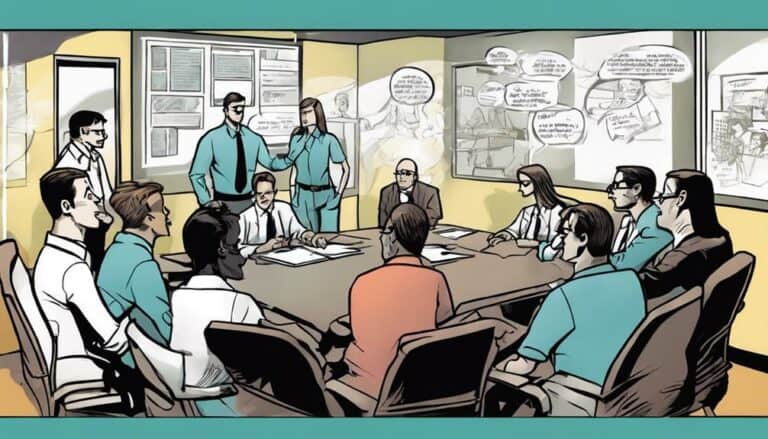When steering through the turbulent waters of team conflicts, managers must remember that addressing these challenges is akin to tending a delicate garden. It requires patience, care, and a keen eye for nurturing growth.
By fostering open communication channels, actively listening to team members, and implementing fair conflict resolution practices, managers can lay the groundwork for stronger, more resilient teams.
But how can leaders strike this delicate balance effectively, leading to harmonious team dynamics and increased productivity? Stay tuned to uncover key strategies and insights for mastering conflict resolution within your leadership role.
Key Takeaways
- Embrace conflict proactively to enhance team productivity and cohesion.
- Utilize effective communication and conflict resolution strategies.
- Foster a culture of open dialogue and collaboration within the team.
- Reward and recognize behaviors that promote successful conflict resolution.
Importance of Conflict Management for Leaders
Recognizing the pivotal role conflict management plays in leadership, it's essential for leaders to skillfully navigate and address conflicts within their teams to foster productivity and cohesion. Conflict within a team is inevitable due to varying personalities, perspectives, and goals.
As a leader, your ability to embrace conflict and effectively manage it can lead to a more productive team. Conflict resolution isn't about avoiding conflicts altogether but rather about addressing them promptly and constructively. By proactively resolving conflicts between team members, you can prevent future issues from escalating and maintain clear lines of communication within the team.
Understanding the importance of conflict management in leadership allows you to create a work environment where team members feel heard, valued, and supported. Ultimately, by mastering conflict management skills, you can build a cohesive team that works collaboratively towards achieving common goals and driving positive outcomes.
Strategies for Practicing Conflict Management
What're the key strategies that managers can employ to effectively practice conflict management within their teams?
Conflict management skills are important for leaders to navigate team dynamics successfully. By honing leadership skills such as active listening, open communication, and empathy, managers can address conflicts proactively.
Establishing clear team norms and promoting a culture of conflict resolution aids in building stronger teams. When conflicts arise, employing methods like objective analysis, collaborative solution generation, and fair implementation of resolutions are essential.
Encouraging open communication channels allows team members to express concerns freely and fosters a sense of trust within the team. In cases where internal resolution is challenging, seeking third-party intervention can provide impartial guidance.
Ultimately, mastering conflict management not only resolves issues efficiently but also enhances team collaboration, problem-solving, and overall productivity, leading to a more cohesive and successful work environment.
Tips for Effective Conflict Management
To effectively manage conflicts within your team, employing proactive communication strategies is essential for fostering a cohesive work environment. As a leader, your role in conflict management involves actively listening to all team members to grasp their perspectives and emotions. By analyzing conflicts objectively and generating collaborative solutions, you can build stronger teams.
Encouraging open dialogue and establishing clear team norms are key in resolving conflicts effectively. Consider implementing conflict resolution training for your team members to enhance their conflict management skills. Recognizing and rewarding effective conflict resolution behaviors can reinforce positive practices within the team.
Remember to leverage emotional intelligence in handling conflicts and promoting positive reinforcement. Embrace a mindset focused on finding collaborative solutions that benefit the entire team. By prioritizing effective communication and proactive conflict resolution strategies, you can navigate conflicts successfully and foster a more harmonious work environment.
Benefits of Conflict Resolution in Teams
Employing effective conflict resolution in teams enhances psychological safety, fosters trust, and encourages open communication among team members. By addressing conflicts head-on, you create an environment where team members feel vital to express their opinions and ideas without fear of judgment. This trust and open communication are the bedrock for innovation and productivity within the team. Resolving conflicts not only leads to a more harmonious work environment but also turbocharges the team's ability to generate new ideas and solutions.
Moreover, when conflicts are handled effectively, the team can focus on delivering value and achieving its goals. Documented conflict resolution strategies also play an important role in fostering a culture of learning and continuous improvement. As a leader, prioritizing conflict resolution not only builds trust among team members but also paves the way for a more innovative, productive, and cohesive team. Remember, conflict resolution isn't just about solving disputes; it's about creating a space for growth and success.
Considerations for Conflict Resolution in Leadership
When addressing conflict resolution in leadership, it's essential to proactively engage in active listening, empathy, and fostering effective communication within your team. As a leader, your role in managing conflict is critical for maintaining a harmonious work environment.
Utilizing tools like the Thomas-Kilmann Conflict Mode Instrument can help you understand your conflict management style and how to adapt it to different situations. By helping team members understand conflict triggers and establishing clear boundaries, you can prevent issues from escalating.
Building trust and enhancing collaboration are key components of successful conflict resolution. Addressing conflicts promptly and effectively not only resolves current issues but also improves teamwork and prevents future conflicts.
Aligning goals, improving communication, and using past successful resolutions as a guide can contribute to a more cohesive and productive team dynamic. Implementing these strategies won't only strengthen your team but also foster a positive work culture centered around effective conflict resolution.
Conclusion
To summarize, as a leader, you must prioritize conflict management to build stronger teams.
By implementing effective strategies and fostering open communication, you can navigate conflicts with ease and create a collaborative work environment.
Remember, conflict resolution is like a beacon guiding your team through stormy seas, leading them towards success and unity.
Embrace this process, and watch your team flourish under your leadership.

